- Home
- Dirk Patton
Coldfall Page 10
Coldfall Read online
Page 10
“This is the FBI! Who else is there if they’re in on it?”
“A reporter, then!”
“Which one? You trust any of them after the last few years? They’ll just call one of their buddies in the government and the pics will disappear. And so will we!”
“Then what, Joe? I’m not going to do nothing!” her eyes flashed a warning sign as she shouted.
I shook my head in frustration. There was no doubt she was right. We needed to get this to someone who could do something with it. But I was sure I was right, too. There was no one we could trust to do the right thing with what would blow the lid off the government’s claim that a militia had ambushed its agents.
“We need to move,” I finally said. “Those guys we left back there will figure out a way to call for help. We’ve gotta be gone before anyone else shows up.”
“Where do we go?”
“Just drive, Tanya. I don’t know, but we’ve gotta get away from your ranch.”
It was quiet in the Suburban for a long time, only the rumble of the idling engine breaking the silence of the night. Finally, she sniffed, wiped her nose and got us moving again.
We drove in silence, each lost in our own thoughts. I could imagine Tanya was picturing the image she’d seen of her father’s bullet riddled body on top of her mother. He’d tried to save her, giving his life in a vain attempt to protect hers. All I could think about was what to do.
Tanya slowed to a stop when we reached the highway. Both of us looked up and down the long stretch of dark road. Far to the left was a set of lights coming our direction. I stared at them for a moment, not at all reassured when I didn’t see flashing roof lights. That meant nothing, especially out here in the middle of nowhere. The cops routinely ran without their emergency beacons because there just wasn’t enough traffic for them to be needed.
“Right,” I said. “Toward the mountains.”
Tanya didn’t question me and didn’t argue. A minute later we were on asphalt, accelerating quickly.
“Know anyone your dad served with, other than my dad?” I asked suddenly when I had an idea.
“No,” Tanya said, shaking her head. “I mean, I’ve met a couple of them, but only for a few minutes. Don’t know their names.”
I nodded in understanding. I was in the same boat. But… maybe… Grabbing up my phone, I started to press a speed dial number, then hesitated. Was this a good idea?
“Who are you calling?” Tanya asked, sounding alarmed.
“My mom.”
Tanya shot me a look but didn’t say anything. Taking a deep breath, I pressed the button and held the handset to my ear.
Chapter 17
The white van turned its blinker on well in advance of the exit from Interstate 25 into downtown Casper, Wyoming. It was early morning, slightly after eight o’clock and the traffic in the small city was moving without any congestion. The driver carefully checked his mirrors before transitioning to the exit lane, then slowed to descend the ramp to street level. Coming to a gentle stop, he patiently waited for the light to change.
Behind him, seven heavily armed men wearing camouflage and body armor sat silent and composed. With them, dressed and armed identically was a heavy-set man in dire need of a shave. He was sweating profusely and swallowing frequently as he looked around at his companions.
His name was Bob Evans and he was terrified. Didn’t know what he’d gotten himself into and sure didn’t know how to get out of it. A local truck driver by trade, he was a loner who adopted an entirely different persona when he was online.
Some years ago, he’d created a Facebook page for the Wyoming Minutemen. According to what he’d written, the WM boasted over five hundred members, all former military special forces. But he was the only one and the closest he’d ever come to being an operator was watching a Rambo movie.
There were a handful of photos showing Bob shooting his rifle out on the plains. These were labeled as individual training. There were also dozens of videos he’d stolen from various sites that depicted large groups of masked men going through actual fire and movement exercises. These were purported to be just some of the WM’s members, preparing for the coming collapse of society.
In addition, Bob was a prolific poster. As many as four or five times a day, he would launch into a treatise against some aspect of the government. He hated the Jewish mayor of Casper. The Catholic governor of the state was an abomination. The EPA was secretly trying to distribute mind control drugs through America’s drinking water system. Congress should be disbanded and the Supreme Court deserved to be hung from the roof of the Lincoln Memorial for what they were doing to America.
Then, amidst the heated rhetoric running up to the last election, he commented that one of the candidates should be chained and tossed into the ocean. Certainly mild in comparison to many of the things being said at the time, but it was enough to draw the attention of the Secret Service.
When the Secret Service becomes aware of a threat to the President, or POTUS, whether veiled or direct, there is a special team that will analyze and categorize the risk. For Bob’s comment, they classified him as the lowest threat level that still warranted further investigation.
The case was sent to the Secret Service field office in Denver, the closest one to Casper, Wyoming. A pair of agents was assigned, but after reviewing the information, didn’t see the need to make the several hour drive to interview Bob. Instead, they placed a call to the FBI, who maintained a small Resident Agency in Casper that was run by a supervisory agent and housed three other field agents.
So, it was a pair of these agents that made the short trip from their office in downtown Casper to Bob’s shack on the edge of town. He’d answered the door and begun trembling the moment they flipped their ID cases open. Their interview had lasted less than half an hour. That was all it took for them to realize he was nothing more than a pathetic, lonely man who wasn’t a threat to anyone.
They returned to their office, filed their report and sent a copy to the Secret Service in Denver. Then everyone forgot about Bob. But the government never throws away a report. And in the digital age, storage is cheap, so it wasn’t difficult to identify him as a candidate when an analyst at the CIA went looking for a patsy.
Bob was profiled by a team that analyzed and assessed potential foreign assets. They evaluated what it would take to successfully dupe him into working for them. Money was typically the most successful inducement, but they found few indications that Bob cared about becoming wealthy. The in with him was directly related to his isolation from society.
He was friendless. Thirty-three years old without ever even having had a girlfriend. He didn’t own a pet. His life revolved around the fantasy militia he’d created on the internet.
The right woman was selected to recruit Bob. Not too pretty, which would have been a dead giveaway that something wasn’t what it seemed, and just friendly enough.
Within two weeks, she had him referring to her as his girlfriend. A month later, he proposed marriage. Before she would say yes, she told him he had to get approval from her brother, Sam.
The man playing the role of her brother was everything Bob fantasized about being. Tall, powerful, handsome and an Army veteran of Iraq and Afghanistan. Bob was enamored, especially so when Sam told him in confidence that he was a Lieutenant in a militia. A real militia.
His words had stung until he’d offered to vouch for Bob so he could join. Jumping at the offer, Bob had gone to meet Sam’s men and was warmly welcomed. He was allowed to train with them, then was invited on an overnight exercise in the mountains. He was over the moon.
It was around a campfire in the Wyoming wilderness that Sam offered Bob a deal. A twofer, as he put it. The militia had an operation scheduled in the near future, and if Bob wanted to become a full member he could do so by participating. And if they were successful, Sam would give Bob his blessing to marry his sister.
Bob agreed without hesitation. Without even asking what th
e operation was. All he cared about was he finally had a girlfriend and was in the company of men he idolized.
He was sent home the next morning to wait for Sam’s call. To prepare. To be ready to answer the bell of liberty at a moment’s notice. He was happier than he’d ever been in his life, never being more than an arm’s reach from his phone in anticipation of the call.
Sam’s report to his superiors had wholeheartedly endorsed Bob as the perfect candidate. With approval received, he and his team of former operators turned private contractors had kept tabs on Bob while they waited for the go order. Bob never knew he was being watched.
The night before, that order had been received. Within half an hour, Sam placed a call to Bob, who was then picked up by two of his men. They’d taken Bob to an abandoned warehouse where the team went over the operation that was jumping off the next morning.
Bob, who had never really believed an operation would amount to anything other than a training exercise, recoiled in shock when he learned what their real intent was. Eyes wide in fear, he’d first tried to talk Sam out of going through with it. When that failed, he begged to be taken home, promising he’d never tell anyone.
Having expected initial resistance, Sam had brought in the woman pretending to be his sister. A trained operative, she knew exactly the right way to calm Bob’s objections. Once he’d settled down, she’d taken his hand and led him to a vacant office that conveniently held a small bed. By morning, he was willing to do whatever Sam asked of him, so long as she was there waiting for her hero to return from battle.
As the team pulled away from the warehouse, she sent a signal that alerted an NSA specialist to start work on Bob’s online footprint. Within minutes, even the sharpest of investigators would have been completely convinced that Bob was an extremely dangerous, rabidly radical militia member with a pathological hatred of the government.
Now, sitting next to Sam, the full import of what he was about to participate in was hitting home. As the van made a gentle turn to head south on Center Street, he silently prayed for one of the passing vehicles to collide with them so the operation would be scrubbed.
“You’ll be great, Bob!” Sam clapped him on the knee and gave him a big smile.
Bob jerked his head up and down, wattles of fat beneath his whiskered chin wiggling and shedding drops of sweat onto the front of his shirt. He was unable to speak.
It was a short drive to A Street, the driver slowing as he turned east. Bob could see over his shoulder and caught sight of the building that was their target. Around him, there was a rattle of weapons as the team prepared themselves. Balaclavas were pulled down to cover faces and noise-cancelling, electronic ear protection was put in place.
“Your face, Bob,” Sam said gently.
With a shaking hand, Bob worked his mask down and put the ear muffs on. Sam looked at him a moment, then reached over and clicked the switch that activated them. With built in microphones, they would clearly transmit sounds to the wearer, but would block the damaging noise level when a weapon was fired.
The driver made another turn onto an even narrower street, then eased into a parking lot, passing a blue sign warning that they were entering US Government property. Three sedans and two SUVs with government plates were parked to the side, four more vehicles with Wyoming plates near the entrance.
It was Wednesday morning and Sam knew from weeks of surveillance that the supervisory agent had a standing meeting scheduled for oh-eight-hundred with the three agents assigned to the office. They would all be in a small conference room, the meeting having just begun.
He also knew from a review of highly sensitive documents that the conference room was in the middle of the building, off the main hallway, and didn’t have any windows as it doubled as a SCIF or Secure Compartmented Information Facility. A room where the agents could freely discuss classified information without fear of eavesdropping.
They passed a long, low section of the building with large windows looking out onto the lot. These were the agent’s offices and as the van glided to a stop he leaned forward to ensure all were empty.
“Clear,” he said loud enough for everyone in the van to hear. “Let’s go!”
The side door was immediately yanked open and the team poured out onto the asphalt, running for the entrance with their rifles up, scanning for any threat. Sam grabbed Bob’s arm, dragging him out of the van and urging him to a run as he followed his men up a gentle ramp to a set of double glass doors. Neatly stenciled on one of them was a logo, surrounded by the words Federal Bureau Of Investigation.
Knowing the glass was ballistic rated and the steel frames reinforced, they had come prepared. The team moved to the side as Sam ran up, with Bob still in tow, and slapped a small, shaped block of plastic explosive on the center locking point of the doors. Pulling a striker fuse, he pushed Bob and rolled away from the breaching charge.
Two seconds later, the C-4 detonated with a sharp bang that was reduced to a dull thump by the hearing protection. The doors swung freely and Sam spun, running through as two of the men pulled them fully open. His second in command held Bob back as the rest of the team came in tight on Sam’s back, then followed, pushing the fat man through the entrance ahead of him. It was less than ten seconds since they’d left the van.
Sam raced ahead, three men staying with him as the others spread into the open office space. It was only sixty feet from the entrance to the conference room door and Sam reached it as it was pulled open from inside.
Jay Abbot, the supervisory agent, came face to face with the masked man, the other three agents clustered tightly behind him. His weapon was already out and coming up as Sam fired a burst into his chest that sent him reeling back into his staff. That moment of confusion bought Sam all the time he needed to push into the room and riddle the bodies of each of the agents with rifle fire. None of the targets managed to get off a single defensive shot before they died.
“Targets down,” Sam called over an encrypted radio to the team.
Two men rushed in and lifted the supervisory agent to his feet, holding him upright. Sam moved behind the body, picking the fallen pistol off the floor and working it into the man’s hand with his tightly gripping the outside so the pistol didn’t fall out. Raising the dead arm, he aimed at the open door and slipped his gloved finger onto the trigger.
“Bring him back,” he transmitted.
Bob hadn’t been given a radio and only knew to move when he was pushed from behind. Sam’s second stayed back, motioning him to continue when he glanced nervously over his shoulder. He had no idea what they wanted him to do, but was in too far to not keep going.
Ahead, he saw an open door. Pausing, he was pushed again, the man behind reaching past to point at the door. Slowly, Bob shuffled forward, his rifle swinging freely at the end of its sling. Reaching the opening, he stepped fully into view and looked into the room. His eyes began to widen in shock when he saw the pistol, then Sam pulled the trigger.
The first two rounds slammed harmlessly into Bob’s body armor, but he still started to fall back, thinking he’d been shot. Then a third bullet punched into his forehead. His body toppled, bouncing off the wall and coming to rest on the cheap, government carpet.
“In three… two…” Sam said to the men holding up the corpse, “one!”
Coordinated, all three released the body and stepped away as it dropped to the floor. The pistol jarred loose from the lifeless hand, coming to rest a few inches away. Sam surveyed the scene for a moment before stepping around the dead agent and dashing into the hall.
Leaning over Bob’s body, he quickly disconnected the dead man’s rifle from its sling and handed it to his second. Releasing his, he attached it to Bob’s sling. This was a rifle that Bob had handled repeatedly on their training days, as well as having loaded the ammunition that was in the magazine. His prints were all over the weapon as well as the glittering brass shell casings on the hallway carpet.
Sam nodded at the men who’d helpe
d with the FBI agent. Grunting under Bob’s considerable weight, they picked him up, holding him in place while Sam pressed Bob’s limp hands onto the weapon, aimed it into the office and fired three bursts that shredded office chairs, the conference table and a large flat screen monitor.
He let the weapon fall and stepped clear as the corpse tumbled back onto the floor. Taking a moment to look over the scene he’d just created, he carefully reviewed what he’d staged in his head. Every weapon that had been fired would be found at the scene. The two men involved would both have gunshot residue on their skin and clothing. When bullet trajectories were analyzed, they would have all come from the right elevation and angle.
“Good,” he said to his second.
The man paused, looking over the scene.
“Good,” he confirmed.
“We’re extracting!” Sam called, following his men down the hall at a run.
He slowed, counting heads as the team streamed out into the morning sunshine and leapt aboard the waiting van. Stopping at the entrance, he pulled a can of red spray paint from his pocket and shoved the doors closed. Quickly, he drew a symbol that was vaguely reminiscent of a swastika onto the glass, being sure it obscured the FBI logo. It exactly matched a symbol that was prominent on the anger filled Wyoming Minutemen Facebook page and would also be found painted on the interior walls of Bob’s home.
Pocketing the can, he ran and jumped through the side door, the van immediately going into motion as one of his men slammed it shut.
“How long?” he asked the driver.
“Sixty-three seconds,” the man said, easing the van out of the parking lot and gently accelerating. “You guys are getting old and slow.”
“Fuck off,” came from the back, earning a sharp look from Sam.
“Any response yet?” Sam asked.
One of the driver’s jobs had been to monitor the local police department with a radio mounted beneath the dash.
“Nothing yet. No one on the street. Only one car went by and it was quiet when it did, so it may take them a while to find this.”

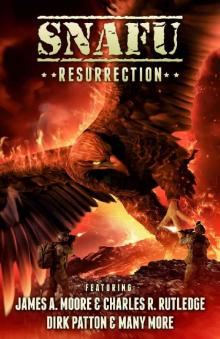 SNAFU: Resurrection
SNAFU: Resurrection The Awakening
The Awakening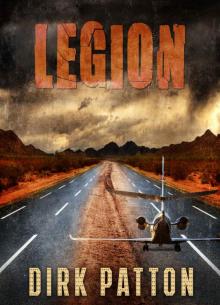 Legion: V Plague Book 19
Legion: V Plague Book 19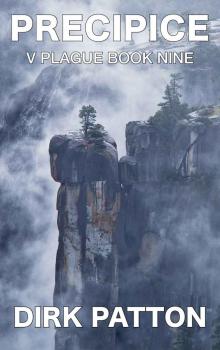 Precipice: V Plague Book 9
Precipice: V Plague Book 9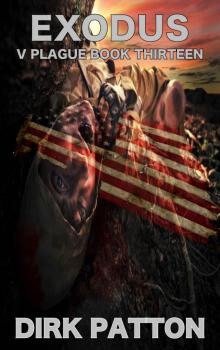 V Plague (Book 13): Exodus
V Plague (Book 13): Exodus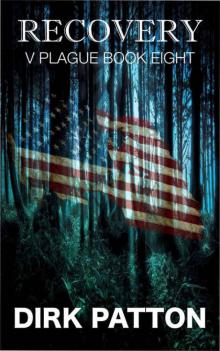 Recovery: V Plague Book 8
Recovery: V Plague Book 8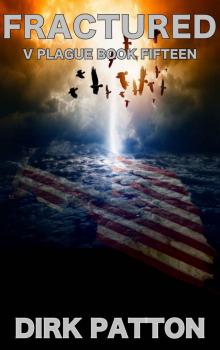 Fractured: V Plague Book 15
Fractured: V Plague Book 15 36: A Novel
36: A Novel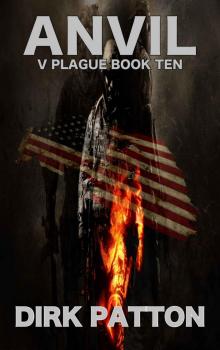 Anvil
Anvil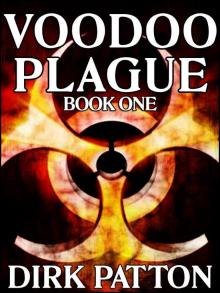 Voodoo Plague - 01
Voodoo Plague - 01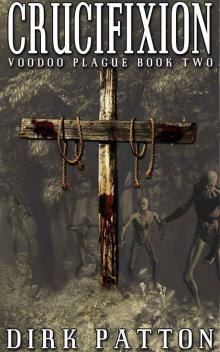 Crucifixion - 02
Crucifixion - 02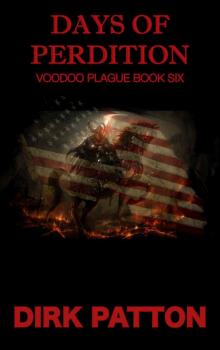 Days Of Perdition: Voodoo Plague Book 6
Days Of Perdition: Voodoo Plague Book 6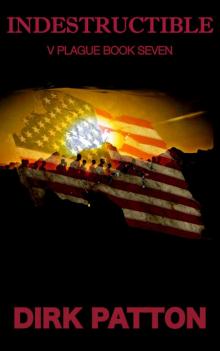 Indestructible: V Plague Book 7
Indestructible: V Plague Book 7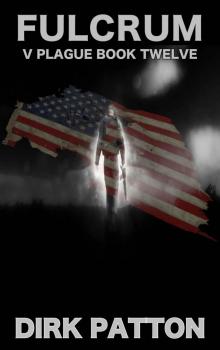 Fulcrum: V Plague Book 12
Fulcrum: V Plague Book 12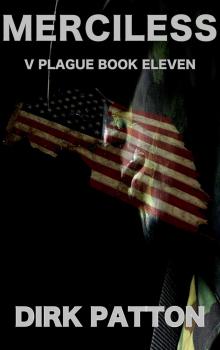 V Plague (Book 11): Merciless
V Plague (Book 11): Merciless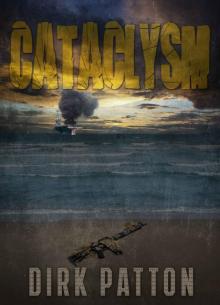 Cataclysm: V Plague Book 18
Cataclysm: V Plague Book 18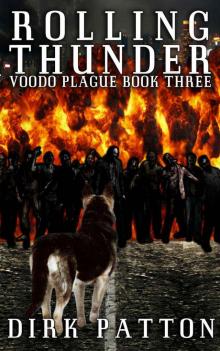 Rolling Thunder - 03
Rolling Thunder - 03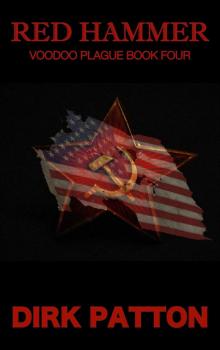 Red Hammer: Voodoo Plague Book 4
Red Hammer: Voodoo Plague Book 4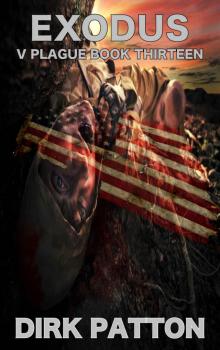 Exodus: V Plague Book 13
Exodus: V Plague Book 13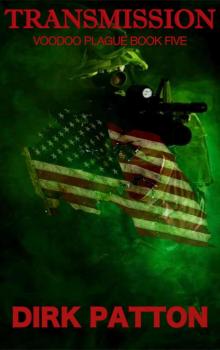 Transmission: Voodoo Plague Book 5
Transmission: Voodoo Plague Book 5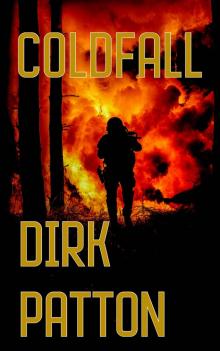 Coldfall
Coldfall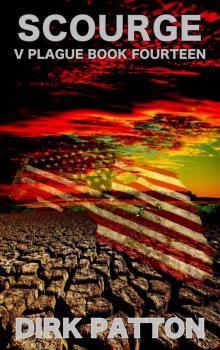 Scourge: V Plague Book 14
Scourge: V Plague Book 14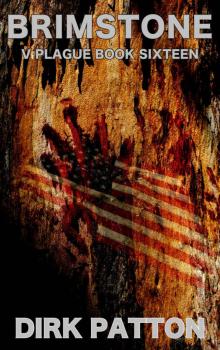 V Plague (Book 16): Brimstone
V Plague (Book 16): Brimstone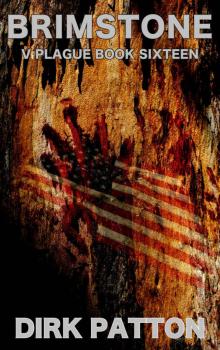 Brimstone: V Plague Book 16
Brimstone: V Plague Book 16